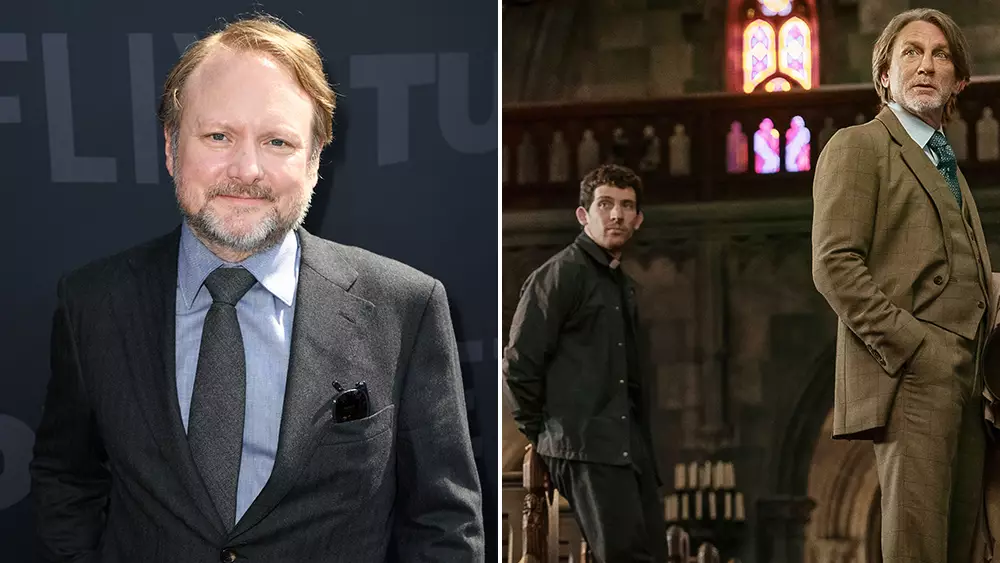Rian Johnson’s upcoming film, *Wake Up Dead Man: A Knives Out Mystery*, promises a daring departure from the playful irreverence of *Glass Onion*, signaling not only a shift in tone but a deliberate homage to the darker origins of detective storytelling. Johnson’s revelation about embracing a *Gothic* atmosphere signifies a conscious effort to reconnect with the genre’s formative influences, predating even the legendary collaborations of Agatha Christie and Edgar Allan Poe. This move underscores a critical understanding: true innovation often involves revisiting and reinterpreting the genre’s roots in a way that feels both authentic and compelling.
Johnson’s decision reflects a broader creative philosophy—rejecting complacency and refusing to churn out formulaic sequels that merely mimic previous successes. The *Knives Out* franchise, initially rooted in clever, contemporary murder mysteries, now seeks to evolve, shedding its bright, campy veneer in favor of something more atmospheric and immersive. This is a bold choice, particularly as the franchise enjoys burgeoning popularity, and it underscores Johnson’s desire to challenge both himself and his audience. The Gothic tone promises a narrative steeped in mood, suspense, and perhaps a touch of psychological horror—elements that will invite viewers into a darker, more contemplative world.
Evolution Through Rebellion: Moving Beyond Repetition to Sustain Creative Vitality
Johnson’s candidness about his creative process offers a refreshing perspective on how artists stay invested in their work. “If I feel like I’m repeating myself,” he confesses, “I’m not good enough to hide that from the audience.” This commitment to innovation underscores a vital truth for any long-running franchise: repetition breeds stagnation. For Johnson, each project must be a new experiment, a new leap into uncharted territory that challenges both his skills and the audience’s expectations.
The move towards a Gothic tone is more than just aesthetic—it’s a strategic decision to maintain freshness in a series that could easily become predictable after multiple installments. His analogy of eating the same lunch for three years encapsulates the risk of creative complacency. By deliberately shifting to darker, more grounded storytelling, Johnson aims to reignite his own passion and preserve the franchise’s vitality. It’s a testament to his integrity that he’s not merely chasing box office numeric stability but actively seeking artistic growth.
Furthermore, his openness to future installments—despite the absence of a concrete plan—illustrates a mindset rooted in exploration rather than obligation. Johnson’s willingness to “burn the ship into the sea” each time signals a deep commitment to storytelling as an art form, rather than a mere commercial enterprise. It embodies the relentless pursuit of originality, emphasizing that each film must be a new voyage, even if it risks alienating audiences used to certain tonal conventions.
Implications for Genre and Audience Expectations
The shift toward Gothic aesthetics raises questions about how the audience will respond to this tonal change. Will mystery fans embrace a darker, more atmospheric Benoit Blanc? Or will the gamble risk alienating viewers accustomed to the franchise’s lighter tone? Johnson appears to be undeterred by such concerns, prioritizing artistic authenticity over commercial formulae.
This decision aligns with a broader cultural craving for stories that challenge conventional norms. In an era where audiences seek depth and complexity, a Gothic *Knives Out* could stand apart as a truly immersive experience—not just a whodunnit, but a reflection on the shadows lurking within human nature. It offers a layered narrative environment where atmospheric tension enhances character development and plot intricacies, providing a richer viewer experience.
The star-studded cast, including Glenn Close, Josh Brolin, and Mila Kunis, hints at a production that will blend sophisticated acting with atmospheric storytelling. Their involvement suggests that Johnson’s new tonal direction isn’t merely stylistic but also rooted in compelling character-driven mystery. The return of Benoit Blanc, with his trademark sharp intellect, set against a Gothic backdrop, has the potential to redefine the franchise’s identity altogether.
This evolution signals a broader philosophical stance: storytelling is an ongoing dialogue between creator and audience. By challenging expectations and risking discomfort, Johnson aims to foster a more meaningful engagement—one where viewers are invited into a world that feels real, eerie, and enthralling. His openness about balancing innovation with franchise longevity embodies a fearless dedication to the craft, promising a mystery that’s not only entertaining but also resonant on a deeper, darker level.
